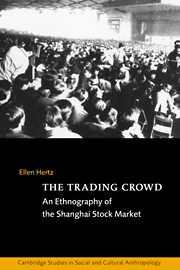Book contents
- Frontmatter
- Contents
- List of illustrations
- Preface
- Acknowledgments
- List of abbreviations
- Conversion rate
- Introduction: Ways and means
- Part I
- 1 First contact
- 2 The Shanghai stock market and the tributary state
- 3 Stock fever (gupiao re)
- 4 City people, stock people
- Part II
- Glossary of Chinese terms
- Bibliography
- Index
- More titles in the Cambridge Studies in Social and Cultural Anthropology series
3 - Stock fever (gupiao re)
Published online by Cambridge University Press: 05 June 2012
- Frontmatter
- Contents
- List of illustrations
- Preface
- Acknowledgments
- List of abbreviations
- Conversion rate
- Introduction: Ways and means
- Part I
- 1 First contact
- 2 The Shanghai stock market and the tributary state
- 3 Stock fever (gupiao re)
- 4 City people, stock people
- Part II
- Glossary of Chinese terms
- Bibliography
- Index
- More titles in the Cambridge Studies in Social and Cultural Anthropology series
Summary
I arrived in Shanghai in February 1992 to begin my fieldwork and got into the car sent by my host institution to meet me at the airport. Two minutes into our ride into the city, the official who had met me turned to me and said: “It's a good thing you came now. If you had come last year, your topic wouldn't have been interesting. Next year, we don't know what will happen. But this year, the stock market is re.”
The social fact
And so I encountered what was to become one of the guiding concepts for this study minutes into my stay in the field. Re means “hot” or “in,” and in this context is often translated as “fever.” “Stock fever” (gupiao re) was manifested by the fact that “everyone” was talking about the stock market; stocks were in, and not to invest in – or at least to have an opinion about – the market was to be out of it. Long lines of people waiting to buy and sell stocks spilled into the streets outside the many stockbroking offices scattered throughout the city. Next to these lines were other crowds: large crowds straining to catch a glimpse of computer screens in the brokerage lobbies, smaller crowds gathered in circles discussing the market's activities, and other even smaller groupings engaging in various forms of deal-making. At night, the city was dotted with groups of (mostly) men standing on the streets in circles of five to fifty, sharing information and predictions.
- Type
- Chapter
- Information
- The Trading CrowdAn Ethnography of the Shanghai Stock Market, pp. 71 - 93Publisher: Cambridge University PressPrint publication year: 1998



